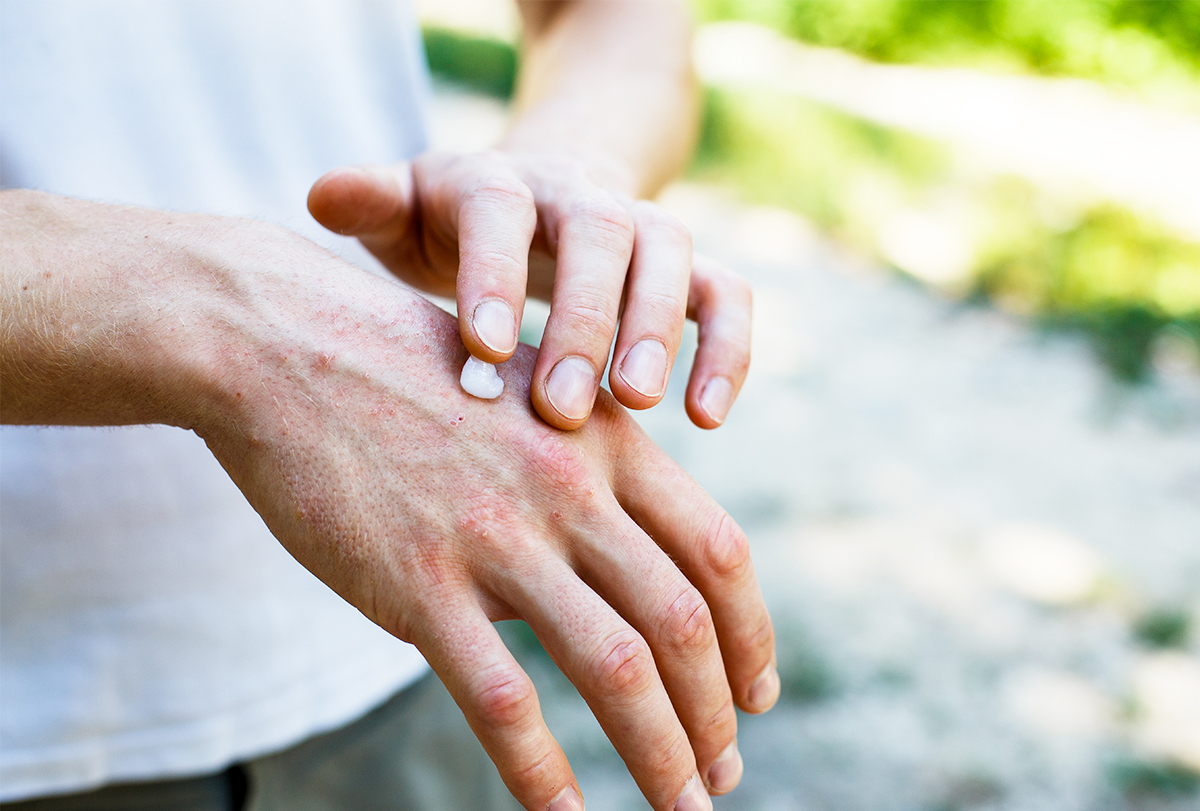In this article:
Eczema or dermatitis refers to a group of different inflammatory skin conditions that usually begin in early childhood. While the symptoms can be easily managed, the condition is often quite long-lasting.

Eczema causes itchiness and dryness in the skin. It is often accompanied by hay fever and food allergies. This article discusses various aspects of eczema and its management.
Probable Eczema Triggers
It is not yet known what exactly causes eczema, but experts are starting to understand the science behind why some get eczema and others do not.
1. Genetics
Researchers trace back the development of eczema to a combination of contributing factors that includes your genes.
2. Skin irritants
Irritants may consist of everyday products or even natural substances that come into contact with your skin. Examples include soaps, detergents, and body washes.
3. Stress and anxiety
Increased stress and anxiety have both been linked with the onset of eczema. Conversely, people with eczema flare-ups tend to experience increased stress and anxiety on account of their condition. (1)
When you are in a stressful or anxious state, adrenaline and cortisol are released inside the body, inducing an inflammatory response in the skin and consequently flaring your eczema symptoms.
4. Extreme temperatures
Extreme temperatures can aggravate eczema symptoms in different ways. A hot, humid climate can lead to excessive sweating, which can irritate your skin and trigger an itch.
On the other hand, the cold winter air can strip away the moisture from your skin and render it drier than usual, leading to an eczema flare-up. (2) As the temperature drops outside, so does the humidity.
The arid air sucks the moisture from the skin, making it increasingly dry and irritated. The indoor heating makes the atmosphere even drier, which adds to the skin irritation.
5. Infections
Infection can aggravate your eczema. Eczema can get secondarily infected with bacteria or viruses in the environment, which may worsen your eczema.
6. Allergens
Allergens from the environment can cause an allergic reaction, triggering a bout of eczema. Common allergens include pollen, dust mites, and mold.
7. Hormones
Hormones can trigger flare-ups. Some women will notice flare-ups of their eczema correlating with their menstrual cycle.
Symptoms of Eczema
The most characteristic symptom of most types of eczema is the development of red, dry, itchy, and irritated patches on different areas of the skin. These rashes typically appear on the face, arms, hands, feet, and behind the knees, but the condition can affect virtually any part of the body.
The eczema rash can be intensely and incessantly itchy, but when you scratch it, the itch only gets worse. The constant friction against the skin only damages it further and can cause it to get thick, dark, and scarred. (3)
Rupturing the protective barrier of the skin due to incessant scratching can provide easy entry to germs and can pave the way for a skin infection.
People with eczema often experience a nighttime aggravation of their symptoms, (4) which may be due to the following factors:
- There is a natural drop in the body’s core temperature at night on account of the daily sleep and wake cycle, which can make the itch worse.
- Most people moisturize their skin during the day but fail to do so at night. Because the lubricating effect of the emollient wears off by bedtime, the itch tends to resurface at night.
- Scratching the skin unwittingly during sleep can make the itch worse, which can lead to disturbed sleep.
- Sheets or pajamas made from certain fabrics may be irritating the skin.
Home Remedies for Eczema
Well-hydrated skin is more capable of defending itself against external irritants. The following natural ingredients and therapies may help relieve eczema symptoms.
1. Oils can help moisturize the skin

Multiple natural oils can help restore moisture in the skin and thereby improve its structural integrity. The hydrating and protective potential of a natural oil depends upon the ratio of oleic acid to linoleic acid.
Linoleic acid is the star ingredient that is credited with the ability to moisturize, repair, and protect the topmost layer of skin while curbing skin irritation and inflammation. (5) Oils that contain high levels of linoleic acid and low levels of oleic acid, such as sunflower seed oil, may be more beneficial in preserving the epidermal barrier while supplementing moisture to the skin.
Other oils that may help relieve eczema symptoms when used topically include argan oil, avocado oil, coconut oil, jojoba oil, and rosehip oil. (6)
On the other hand, olive oil appears to have little benefit when it comes to treating eczema. (5) In fact, the topical application of olive oil can be counterproductive and can worsen your eczema symptoms by further damaging the skin’s protective barrier.
2. Aloe vera can relieve inflammation
Aloe vera is recognized as one of the most skin-friendly natural ingredients there is and has been credited with significant anti-inflammatory, antibacterial, and antifungal properties.
Aloe vera lives up to its reputation as a skin healer and is often employed in topical formulations. This hydrating salve not only relieves skin irritation but also helps repair the skin barrier and reduce the risk of infection. Thus, aloe vera helps improve eczema symptoms.
3. Steaming aids in product absorption
Steaming can help open up the pores of the skin and thereby improve product absorption. Thus, it is beneficial to steam the skin before applying any moisturizer or topical treatment for eczema.
However, this therapy only works for people with mildly dry skin and can be rather counterproductive for those suffering from extreme dryness.
4. Makeup can help hide eczema blemishes
Choosing the right products that will not irritate your skin further is important, as well as creating a good base before applying makeup.
- Avoid added fragrances, preservatives, and ingredients such as salicylic or glycolic acid that may further dry your skin.
- Apply a moisturizing cream base before makeup application.
- Apply makeup using clean fingers.
Dietary Tips for Eczema

Over the years, there has been a lot of research on potential dietary aids to relieve eczema, which includes both foods and supplements. The studies have covered multiple prospects, from probiotics, prebiotics, and fish oil to zinc and some vitamins but have failed to provide any conclusive results. (7)
There is also no evidence to support that specific foods cause eczema symptoms unless you have a true allergy to that food. (8) However, as multiple studies have indicated alterations in gut flora in patients with eczema, it is suggested to maintain a diet that promotes a healthy gut flora. (9) A diet high in fiber, including fruits, vegetables, and whole grains, can help maintain healthy gut flora.
Overall, a healthy diet only helps maintain a healthy mind, body, and skin but does not specifically target the inflammatory response that causes an eczema flare-up. Aiming to drink eight 8-oz glasses of water each day helps to maintain a healthy level of hydration to prevent further skin dryness and irritation.
Tips to Help Manage Eczema
Because eczema has no cure, it is essential to learn how to take care of the skin. (1)
- Keep your skin moisturized. Keep in mind that thick creams and ointments are generally more effective than lotions or oils.
- Manage the symptoms with over-the-counter medications as needed. Consult a board-certified dermatologist to prescribe you something stronger if all else fails to provide relief.
- Maintain a healthy diet.
- Practice mindful meditation.
- Follow a proper exercise routine.
- Do your best to get enough sleep.
- Take a lukewarm bath or shower, pat your skin dry, and apply a fragrance-free moisturizer from head to toe to treat dry skin.
Final Word
Acute eczema can often affect the quality of life. However, it can be easily managed through medication, skincare, avoiding triggers, and lifestyle changes.
Simple things such as keeping your skin moisturized, avoiding stress, and preventing exposure to allergens can go a long way in preventing eczema flare-ups.
- Was this article helpful?
- YES, THANKS!NOT REALLY


